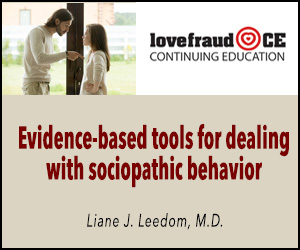The subject of the overlap between bipolar disorder and sociopathy is important to me personally and professionally. One of the reasons I did not understand my husband was that I saw him as a “bit on the manic side.” In some of the letters he sent me from prison, he declared himself to be “bipolar” rather than psychopathic/sociopathic. My experience is not unique, in our survey of Women Who Love Psychopaths, Sandra L. Brown, M.A. and I asked about manic symptoms in male partners. Over half of the women attested to the presence of these symptoms in their men.
I first wrote about the connection between bipolar disorder and sociopathy in March, 2007. For more background please read ASK Dr. LEEDOM: What is the difference between bipolar disorder and sociopathy?
There is a link between bipolar disorder and sociopathy that has been explored in a very important recent study. Two researchers from the University of Toronto, Dr. Benjamin Goldstein and Dr. Anthony Levitt looked at data from more than 1000 patients with bipolar disorder ((Am J Psychiatry 2006; 163:1633—1636). They divided them into three groups, childhood onset (prior to 13), adolescent onset and adult onset. They then looked at the prevalence of sociopathy in the three groups. Bipolar disorder was associated with sociopathy in 37 percent of childhood onset cases, 30 percent of adolescent onset cases and 16 percent of adult onset cases. It should be noted that these percentages are all much higher than the estimated prevalence of sociopathy in the general population (4%). I did find research from another group in Britain essentially verifying these results.
The above results suggest that the manic mood problems that are associated with bipolar disorder interfere with personality development. The earlier the manic mood problems start, the more personality is affected. I have had the privilege of teaching child adolescent and adult development many times now. It is well established that our personalities do not stop developing at 18 that is why mood problems at any age can affect personality.
Why would a manic mood be associated with the development of sociopathy? Next week I will explore this notion further reporting on a study of fearless temperament in children. This week though I would like to point out that when many people are manic, they become preoccupied with power and dominance. It is very common for manic patients to believe they are some powerful political or religious leader. One group of animal researchers has put together some convincing arguments that dominance in rats can be used as an animal model to test medications for mania. So mania and dominance motivation have the same biologic correlates.
Although a sense of wanting to accomplish tasks and become independent are important for adults and children, excessive dominance can impair a person’s ability to love. Since children are in the process of learning to love, a preoccupation with dominance can poison all their social interactions. A dominant child that frequently misbehaves becomes a target for discipline by all the adults in his/her life. Although discipline may be necessary, excessive discipline prevents the child from enjoying loving interactions with his parents and teachers. If a child does not learn to enjoy love, he/she will likely not incorporate loving behaviors into his/her personality. Without loving behaviors there is nothing to prevent exploitation of others.
All of this leads me to say that temperamentally and genetically at risk children need specialized focused, loving parenting. At risk children include the offspring of parents with bipolar disorder, sociopathy/psychopathy, addiction, alcoholism and ADHD. If you are a parent of an at risk child, I encourage you to visit Parenting the at-risk child and consider joining the new Forum. This Forum is operated by the Aftermath group, which is a joint collaboration between victims and researchers. I would like to see parents supporting each other through the very difficult task of preventing sociopathy in at risk kids. Although many children will develop disordered in spite of the best parenting and professional help available, there is much indirect evidence that parenting can make a difference for some. More on genetics and temperament next week.
ADDENDUM: The afternoon after I wrote this news organizations broke the story of Peter Dawson who was sentensed to prison for a scheme that defrauded seniors out of their life savings. Dawson is quoted as to saying he has “bipolar disorder.” District Attorney Kathleen Rice stated “Mr. Dawson preyed on his clients, many of them elderly, in order to line his own pockets, and he abused his position of trust to satisfy his own lifestyle,” -Mr. Dawson may have bipolar disorder but he is also described as a predator by Ms. Rice.





































